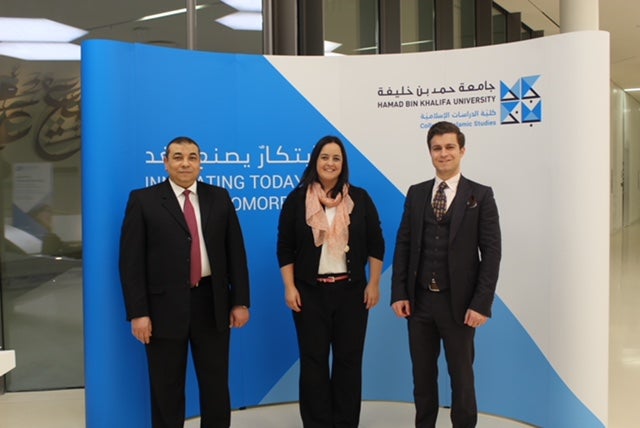
Juris Doctor(JD) students at the College of Law and Public Policy(CLPP) of Hamad Bin Khalifa University (HBKU) recently attended a special guest lecture on the courts of the State of Qatar and local judicial processes. The lecture, conducted within CLPP’s JD program and falling within Qatari law firm Sultan Al-Abdulla & Partners’ (SAP)corporate social responsibility and community engagement initiatives, aimed at providing students with an expert’s perspective of the Qatari court system.
Ashraf Feshawi, the guest speaker and a partner at SAP, provided the students with an overview of the legal framework within the court system in Qatar, as well as judicial steps and procedures available in the country. His lecture explained how the local court system is based on civil law derived from the French as opposed to the Anglo-Saxon common law system, and emphasized the importance of differentiating between the two systems to understand the application of court precedent before the courts.
The students also discussed different types of cases that may be brought before the courts, including civil and trade cases; real estate; construction contract disputes; labor matters; family law cases; and administrative cases.
As part of the lecture, JD students learned more about issues that can arise in practice, such as whether a court can consider cases with a foreign governing law, the duration of cases before the courts of Qatar, and how hearings are conducted before the respective judges.
The Advocacy course is offered within the JD program and covers advocacy in international arbitration and litigation in both civil and common law jurisdictions. As well as learning the theory and practice of advocacy, JD students also participate in a mock trial at the Qatar International Court.
Training sessions and special guest lectures are an integral part of the curriculum at CLPP to ensure that practical skills are developed alongside a theoretical understanding of legal issues and concepts. Mana A. Al-Ansari, a JD student, said: “Mr. Ashraf has been practicing the legal profession in Qatar for more than 18 years, so having a person of such a caliber to deliver some of his expertise was extraordinary. As students of CLPP’s JD program, we are able to benefit from a wide range of applied activities that complement our theoretical knowledge and form a critical component of our learning experience.”
HBKU’s JD program is the first graduate law degree of its kind in the MENA region. It offers training to graduate students from a range of disciplines in the skills needed to understand the diverse legal systems – civil, common, and Sharia – that inform Qatari law and that govern complex events and transactions, both in the region and internationally.





